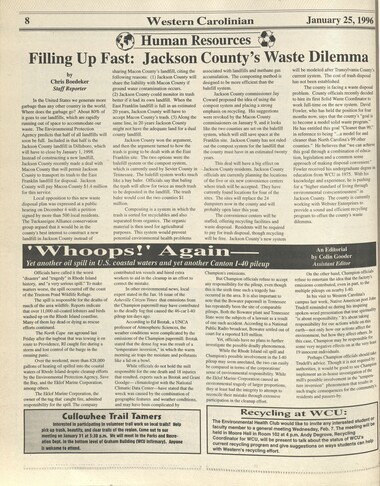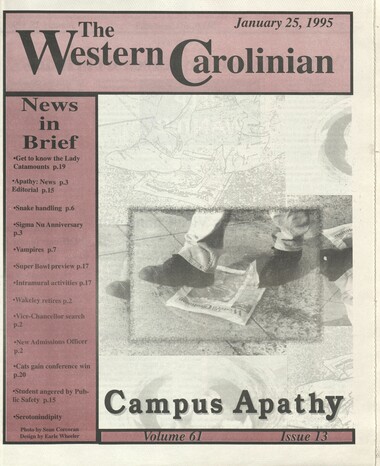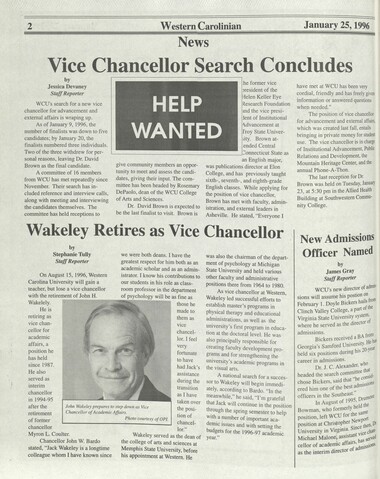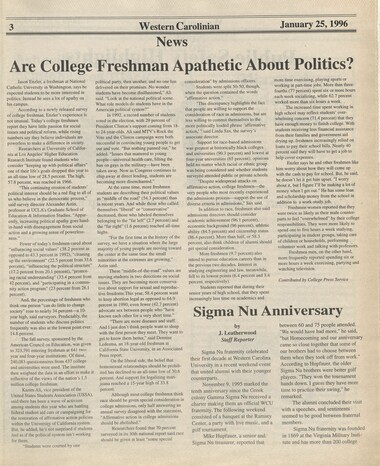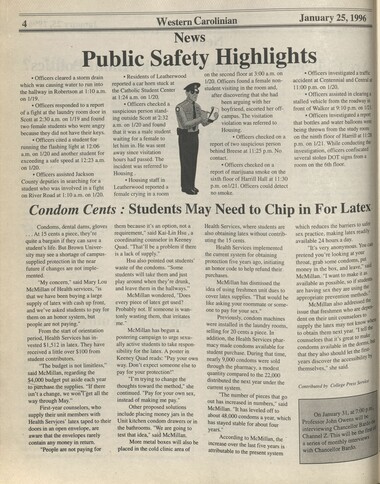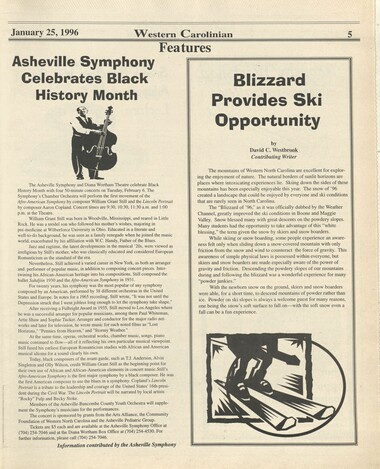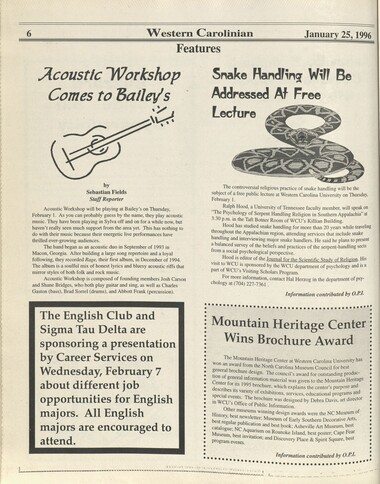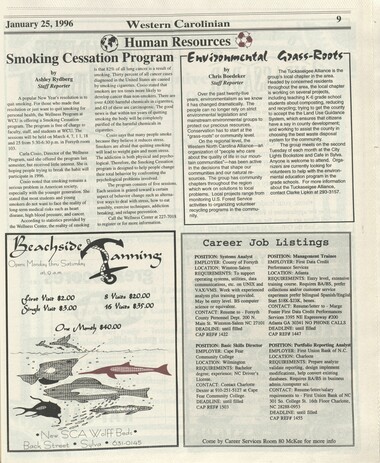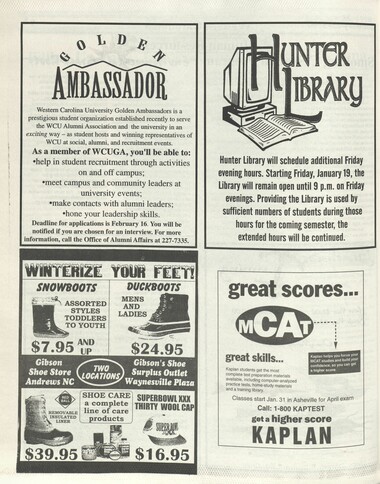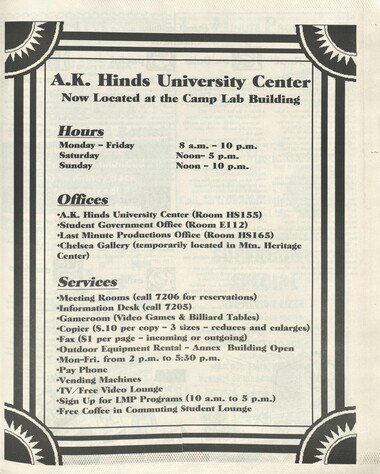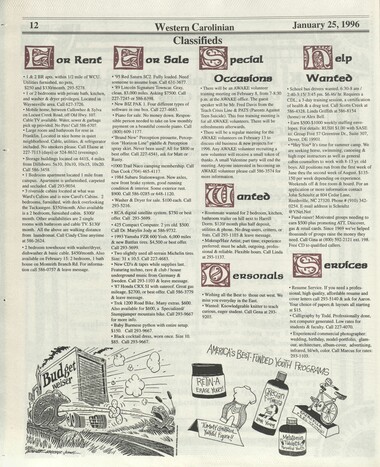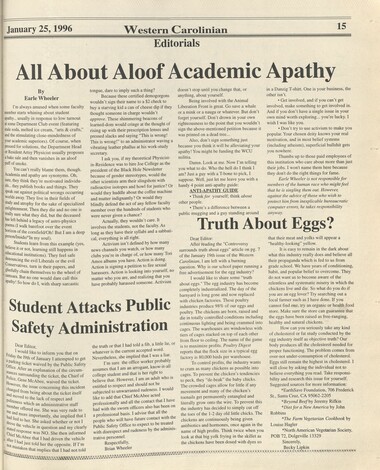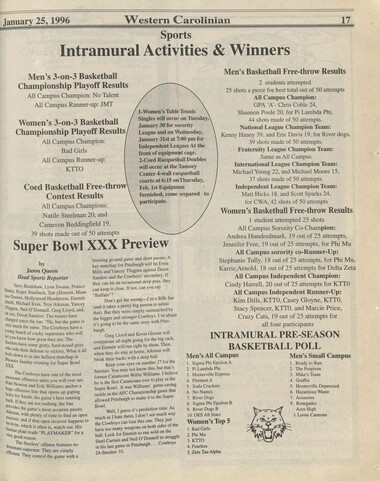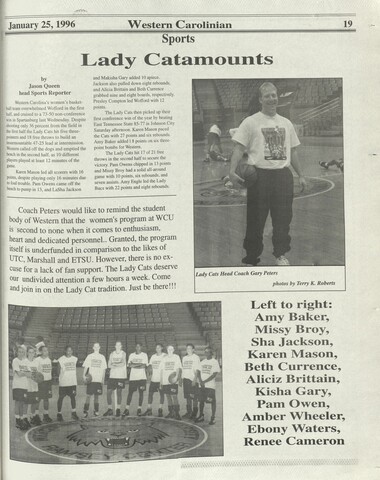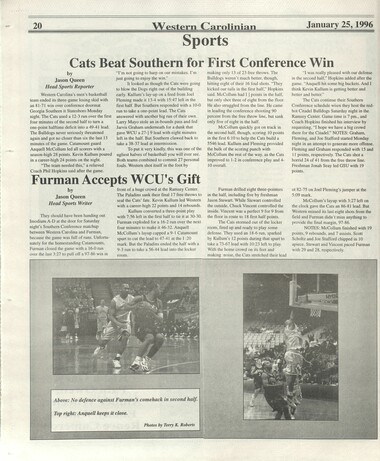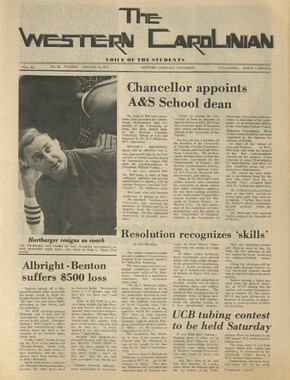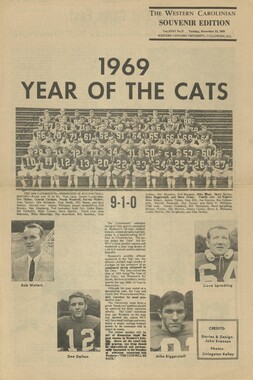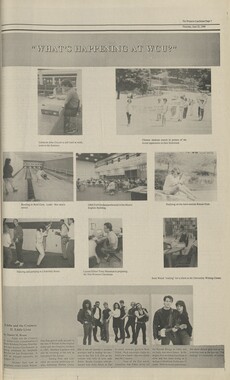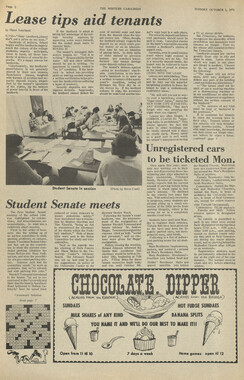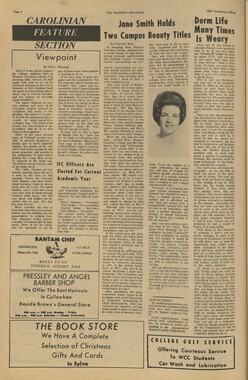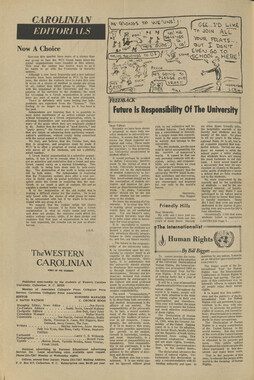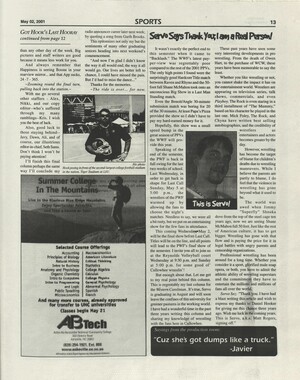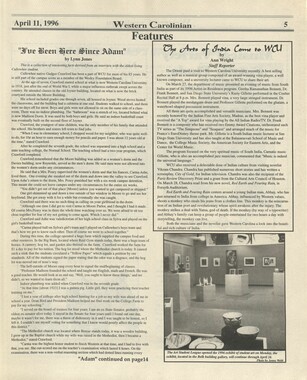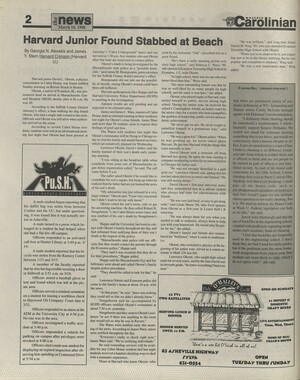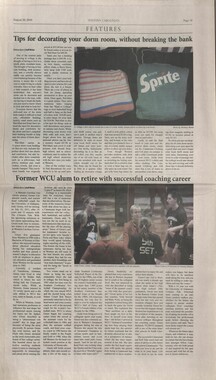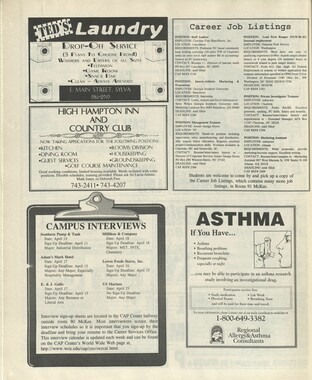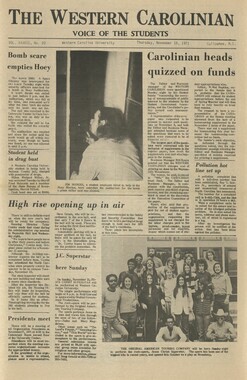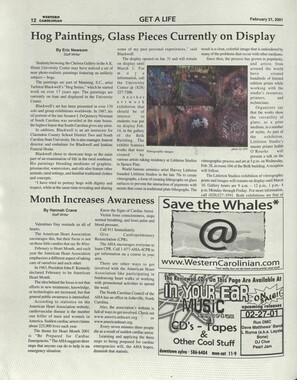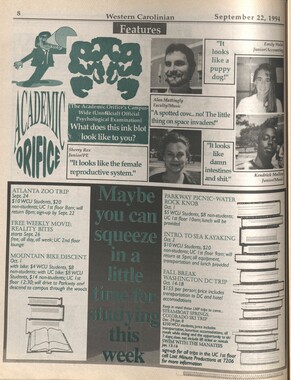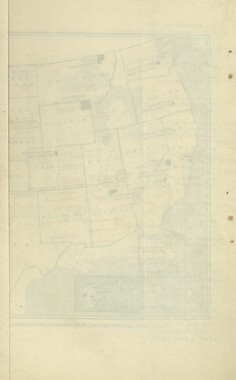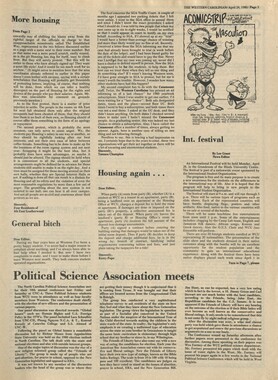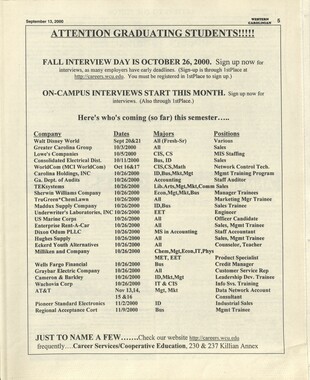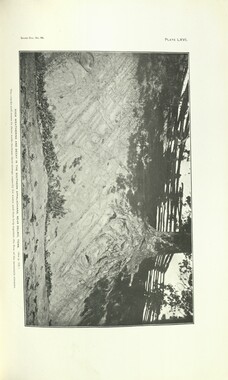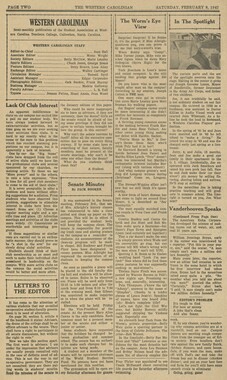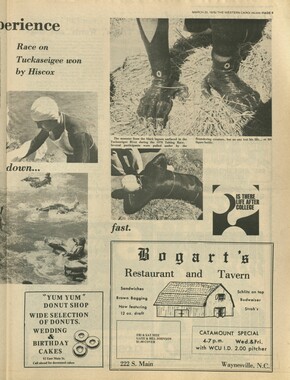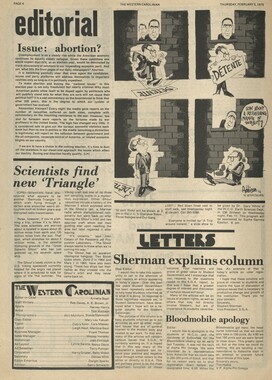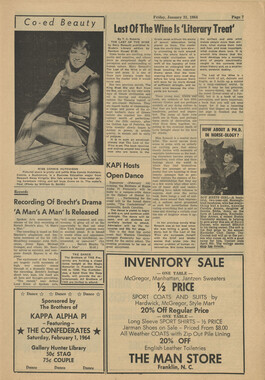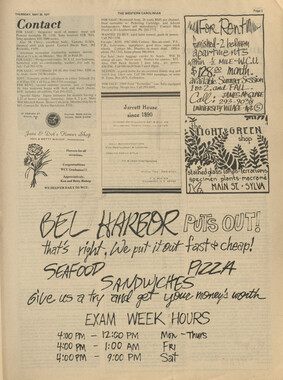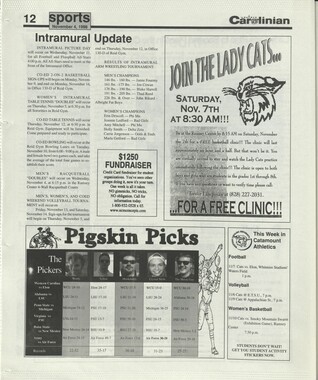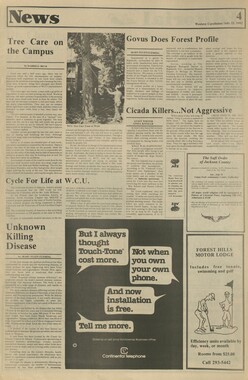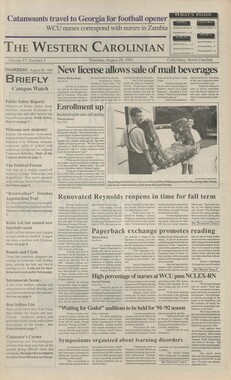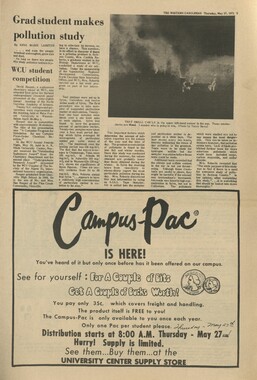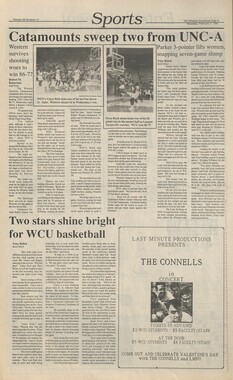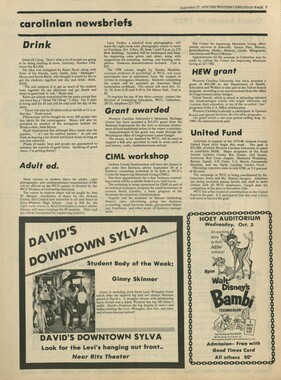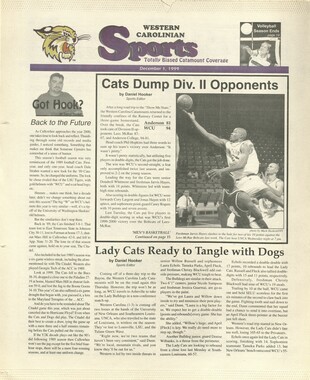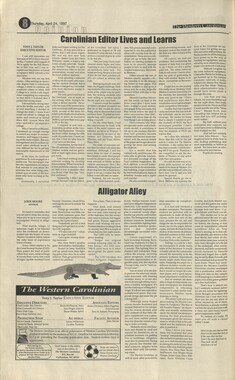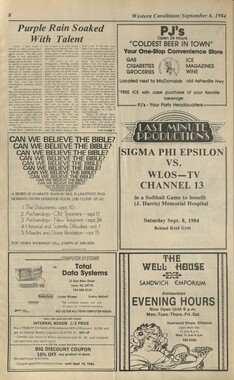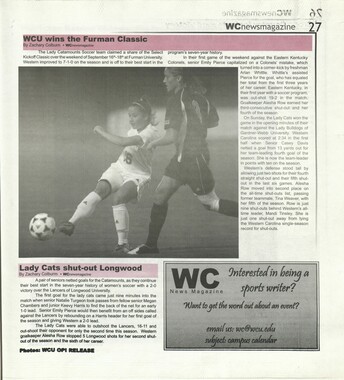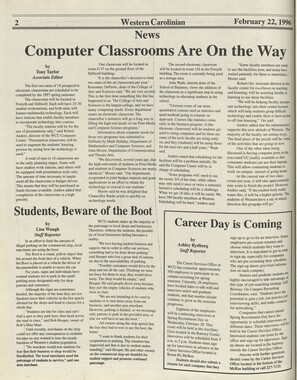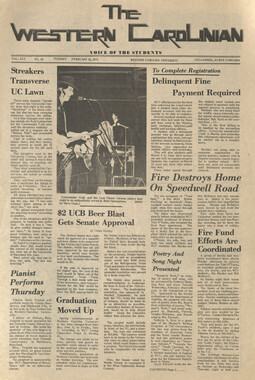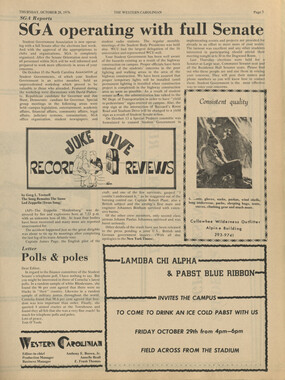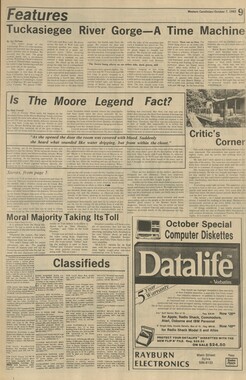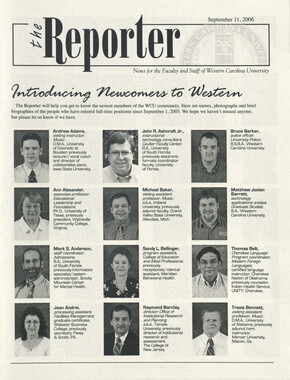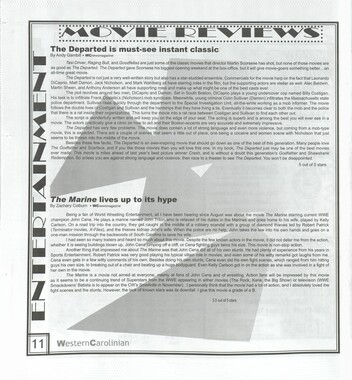Western Carolina University (20)
View all
- Canton Champion Fibre Company (2308)
- Cherokee Traditions (291)
- Civil War in Southern Appalachia (165)
- Craft Revival (1942)
- Great Smoky Mountains - A Park for America (2946)
- Highlights from Western Carolina University (430)
- Horace Kephart (941)
- Journeys Through Jackson (159)
- LGBTQIA+ Archive of Jackson County (85)
- Oral Histories of Western North Carolina (314)
- Picturing Appalachia (6798)
- Stories of Mountain Folk (413)
- Travel Western North Carolina (160)
- Western Carolina University Fine Art Museum Vitreograph Collection (129)
- Western Carolina University Herbarium (92)
- Western Carolina University: Making Memories (708)
- Western Carolina University Publications (2412)
- Western Carolina University Restricted Electronic Theses and Dissertations (146)
- Western North Carolina Regional Maps (71)
- World War II in Southern Appalachia (131)
University of North Carolina Asheville (6)
View all
- Allanstand Cottage Industries (62)
- Appalachian National Park Association (53)
- Bennett, Kelly, 1890-1974 (1388)
- Berry, Walter (76)
- Brasstown Carvers (40)
- Carver, George Washington, 1864?-1943 (26)
- Cathey, Joseph, 1803-1874 (1)
- Champion Fibre Company (233)
- Champion Paper and Fibre Company (297)
- Cherokee Indian Fair Association (16)
- Cherokee Language Program (22)
- Crowe, Amanda (40)
- Edmonston, Thomas Benton, 1842-1907 (7)
- Ensley, A. L. (Abraham Lincoln), 1865-1948 (275)
- Fromer, Irving Rhodes, 1913-1994 (70)
- George Butz (BFS 1907) (46)
- Goodrich, Frances Louisa (120)
- Grant, George Alexander, 1891-1964 (96)
- Heard, Marian Gladys (60)
- Kephart, Calvin, 1883-1969 (15)
- Kephart, Horace, 1862-1931 (313)
- Kephart, Laura, 1862-1954 (39)
- Laney, Gideon Thomas, 1889-1976 (439)
- Masa, George, 1881-1933 (61)
- McElhinney, William Julian, 1896-1953 (44)
- Niggli, Josephina, 1910-1983 (10)
- North Carolina Park Commission (105)
- Osborne, Kezia Stradley (9)
- Owens, Samuel Robert, 1918-1995 (11)
- Penland Weavers and Potters (36)
- Roberts, Vivienne (15)
- Roth, Albert, 1890-1974 (142)
- Schenck, Carl Alwin, 1868-1955 (1)
- Sherrill's Photography Studio (2565)
- Southern Highland Handicraft Guild (127)
- Southern Highlanders, Inc. (71)
- Stalcup, Jesse Bryson (46)
- Stearns, I. K. (213)
- Thompson, James Edward, 1880-1976 (226)
- United States. Indian Arts and Crafts Board (130)
- USFS (683)
- Vance, Zebulon Baird, 1830-1894 (1)
- Weaver, Zebulon, 1872-1948 (58)
- Western Carolina College (230)
- Western Carolina Teachers College (282)
- Western Carolina University (1899)
- Western Carolina University. Mountain Heritage Center (18)
- Whitman, Walt, 1819-1892 (10)
- Wilburn, Hiram Coleman, 1880-1967 (73)
- Williams, Isadora (3)
- Cain, Doreyl Ammons (0)
- Crittenden, Lorraine (0)
- Rhodes, Judy (0)
- Smith, Edward Clark (0)
- Appalachian Region, Southern (2569)
- Asheville (N.C.) (1923)
- Avery County (N.C.) (26)
- Blount County (Tenn.) (195)
- Buncombe County (N.C.) (1672)
- Cherokee County (N.C.) (283)
- Clay County (N.C.) (555)
- Graham County (N.C.) (233)
- Great Smoky Mountains National Park (N.C. and Tenn.) (519)
- Haywood County (N.C.) (3569)
- Henderson County (N.C.) (70)
- Jackson County (N.C.) (4804)
- Knox County (Tenn.) (35)
- Knoxville (Tenn.) (13)
- Lake Santeetlah (N.C.) (10)
- Macon County (N.C.) (420)
- Madison County (N.C.) (215)
- McDowell County (N.C.) (39)
- Mitchell County (N.C.) (132)
- Polk County (N.C.) (35)
- Qualla Boundary (981)
- Rutherford County (N.C.) (76)
- Swain County (N.C.) (2135)
- Transylvania County (N.C.) (270)
- Watauga County (N.C.) (12)
- Waynesville (N.C.) (86)
- Yancey County (N.C.) (72)
- Aerial Photographs (3)
- Aerial Views (60)
- Albums (books) (4)
- Articles (1)
- Artifacts (object Genre) (228)
- Bibliographies (1)
- Biography (general Genre) (2)
- Cards (information Artifacts) (38)
- Clippings (information Artifacts) (191)
- Copybooks (instructional Materials) (3)
- Crafts (art Genres) (622)
- Depictions (visual Works) (21)
- Design Drawings (1)
- Drawings (visual Works) (185)
- Envelopes (73)
- Exhibitions (events) (1)
- Facsimiles (reproductions) (1)
- Fiction (general Genre) (4)
- Financial Records (12)
- Fliers (printed Matter) (67)
- Glass Plate Negatives (381)
- Guidebooks (2)
- Internegatives (10)
- Interviews (815)
- Land Surveys (102)
- Letters (correspondence) (1013)
- Manuscripts (documents) (618)
- Maps (documents) (177)
- Memorandums (25)
- Minutes (administrative Records) (59)
- Negatives (photographs) (6015)
- Newsletters (1290)
- Newspapers (2)
- Notebooks (8)
- Occupation Currency (1)
- Paintings (visual Works) (1)
- Pen And Ink Drawings (1)
- Periodicals (193)
- Personal Narratives (10)
- Photographs (12976)
- Plans (maps) (1)
- Poetry (5)
- Portraits (4539)
- Postcards (329)
- Programs (documents) (151)
- Publications (documents) (2364)
- Questionnaires (65)
- Relief Prints (26)
- Sayings (literary Genre) (1)
- Scrapbooks (282)
- Sheet Music (2)
- Slides (photographs) (402)
- Songs (musical Compositions) (2)
- Sound Recordings (796)
- Specimens (92)
- Speeches (documents) (15)
- Tintypes (photographs) (8)
- Transcripts (322)
- Video Recordings (physical Artifacts) (23)
- Text Messages (0)
- A.L. Ensley Collection (275)
- Appalachian Industrial School Records (7)
- Appalachian National Park Association Records (336)
- Axley-Meroney Collection (2)
- Bayard Wootten Photograph Collection (20)
- Bethel Rural Community Organization Collection (7)
- Blumer Collection (5)
- C.W. Slagle Collection (20)
- Canton Area Historical Museum (2110)
- Carlos C. Campbell Collection (462)
- Cataloochee History Project (64)
- Cherokee Studies Collection (4)
- Daisy Dame Photograph Album (5)
- Daniel Boone VI Collection (1)
- Doris Ulmann Photograph Collection (112)
- Elizabeth H. Lasley Collection (1)
- Elizabeth Woolworth Szold Fleharty Collection (4)
- Frank Fry Collection (95)
- George Masa Collection (173)
- Gideon Laney Collection (452)
- Hazel Scarborough Collection (2)
- Hiram C. Wilburn Papers (28)
- Historic Photographs Collection (236)
- Horace Kephart Collection (861)
- Humbard Collection (33)
- Hunter and Weaver Families Collection (1)
- I. D. Blumenthal Collection (4)
- Isadora Williams Collection (4)
- Jesse Bryson Stalcup Collection (47)
- Jim Thompson Collection (224)
- John B. Battle Collection (7)
- John C. Campbell Folk School Records (80)
- John Parris Collection (6)
- Judaculla Rock project (2)
- Kelly Bennett Collection (1407)
- Love Family Papers (11)
- Major Wiley Parris Civil War Letters (3)
- Map Collection (12)
- McFee-Misemer Civil War Letters (34)
- Mountain Heritage Center Collection (4)
- Norburn - Robertson - Thomson Families Collection (44)
- Pauline Hood Collection (7)
- Pre-Guild Collection (2)
- Qualla Arts and Crafts Mutual Collection (12)
- R.A. Romanes Collection (681)
- Rosser H. Taylor Collection (1)
- Samuel Robert Owens Collection (94)
- Sara Madison Collection (144)
- Sherrill Studio Photo Collection (2558)
- Smoky Mountains Hiking Club Collection (616)
- Stories of Mountain Folk - Radio Programs (374)
- The Reporter, Western Carolina University (510)
- Venoy and Elizabeth Reed Collection (16)
- WCU Gender and Sexuality Oral History Project (32)
- WCU Mountain Heritage Center Oral Histories (25)
- WCU Oral History Collection - Mountain People, Mountain Lives (71)
- WCU Students Newspapers Collection (1843)
- Western North Carolina Tomorrow Black Oral History Project (69)
- William Williams Stringfield Collection (2)
- Zebulon Weaver Collection (109)
- African Americans (390)
- Appalachian Trail (35)
- Artisans (521)
- Cherokee art (84)
- Cherokee artists -- North Carolina (10)
- Cherokee language (21)
- Cherokee pottery (101)
- Cherokee women (208)
- Church buildings (172)
- Civilian Conservation Corps (U.S.) (111)
- College student newspapers and periodicals (1933)
- Dams (107)
- Dance (1023)
- Education (222)
- Floods (61)
- Folk music (1015)
- Forced removal, 1813-1903 (2)
- Forest conservation (220)
- Forests and forestry (1184)
- Gender nonconformity (4)
- Great Smoky Mountains National Park (N.C. and Tenn.) (181)
- Hunting (45)
- Landscape photography (25)
- Logging (119)
- Maps (83)
- Mines and mineral resources (8)
- North Carolina -- Maps (18)
- Paper industry (38)
- Postcards (255)
- Pottery (135)
- Railroad trains (72)
- Rural electrification -- North Carolina, Western (3)
- School integration -- Southern States (2)
- Segregation -- North Carolina, Western (5)
- Slavery (5)
- Sports (452)
- Storytelling (243)
- Waterfalls -- Great Smoky Mountains (N.C. and Tenn.) (66)
- Weaving -- Appalachian Region, Southern (280)
- Wood-carving -- Appalachian Region, Southern (328)
- World War, 1939-1945 (173)
Western Carolinian Volume 61 Number 13
Item
Item’s are ‘child’ level descriptions to ‘parent’ objects, (e.g. one page of a whole book).
-
-
8 Western Carolinian January 25,1996 Human Resources Filling Up Fast: Jackson County's Waste Dilemma by Chris Boedeker Staff Reporter In the United States we generate more garbage than any other country in the world. Where does the garbage go? About 80% of it goes to our landfills, which are rapidly running out of space to accommodate our waste. The Environmental Protection Agency predicts that half of all landfills will soon be full. Included in that half is the Jackson County landfill in Dillsboro, which will have to close by January 1, 1998. Instead of constructing a new landfill, Jackson County recently made a deal with Macon County that will permit Jackson County to transport its trash to the East Franklin landfill for disposal. Jackson County will pay Macon County $1.4 million for this service. Local opposition to this new waste disposal plan was expressed at a public hearing on December 4 with a petition signed by more than 500 local residents. The Tuckaseigee Alliance conservation group argued that it would be in the county's best interest to construct a new landfill in Jackson County instead of sharing Macon County's landfill, citing the following reasons: (1) Jackson County will share the liability with Macon County if ground water contamination occurs. (2) Jackson County could monitor its trash better if it had its own landfill. When the East Franklin landfill is full in an estimated 20 years, Jackson County will have to accept Macon County's trash. (3) Along the same line, in 20 years Jackson County might not have the adequate land for a dual county landfill. Jackson County won the argument, and then the argument turned to how the trash is going to be dealt with at the East Franklin site. The two options were the balefill system or the compost system, which is currently used by Sevier County in Tennessee. The balefill system works much like a hay baler. Officials say that baling the trash will allow for twice as much trash to be deposited in the landfill. The trash baler would cost the two counties $ 1 million. Composting is a system in which the trash is sorted for recyclables and also separated from organics. The organic material is then used for agricultural purposes. This system would prevent potential environmental health problems associated with landfills and methane gas accumulation. The composting method is designed to be more efficient than the balefill system. Jackson County commissioner Jay Coward proposed the idea of using the compost system and placing a strong emphasis on recycling. His suggestions were revoked by the Macon County commissioners on January 9, and it looks like the two counties are set on the balefill system, which will still save space at the Franklin site. Jackson County has not ruled out the compost system for the landfill that the county must have in an estimated twenty years. This deal will have a big effect on Jackson County residents. Jackson County officials are currently planning the locations of the five or six new convenience centers where trash will be accepted. They have currently found locations for four of the sites. The sites will replace the 24 dumpsters now in the county and will probably open later this year. The convenience centers will be staffed, offering recycling facilities and waste disposal. Residents will be required to pay for trash disposal, though recycling will be free. Jackson County's new system 'Whoops!' Again Yet another oil spill in U.S. coastal waters and yet another Canton I-40pileup Officials have called it the worst "disaster" and "tragedy" in Rhode Island history, and "a very serious spill." To make matters worse, the spill occurred off the coast of the Trustom Pond Wildlife Refuge. The spill is responsible for the deaths of much of the area wildlife. Reports indicate that over 11,000 oil-coated lobsters and birds washed up on the Rhode Island coastline. Many of them lay dead or dying as rescue efforts continued. The North Cape ran aground last Friday after the tugboat that was towing it en route to Providence, RI caught fire during a storm and lost control of the barge in the ensuing panic. Over the weekend, more than 828,000 gallons of heating oil spilled into the coastal waters of Rhode Island despite cleanup efforts by the Environmental Protection Agency, Save the Bay, and the Eklof Marine Corporation, among others. The Eklof Marine Corporation, the owner of the tug that caught fire, admitted responsibility for the spill. The company contributed ten vessels and hired extra workers to aid in the cleanup in an effort to correct the mistake. In other environmental news, local expert stated in the Jan. 16 issue of the Asheville Citizen-Times that emissions from the Champion papermill may have contributed to the deadly fog that caused the 46-car 1-40 pileup ten days ago. According to Ed Brotak, a UNCA professor of Atmospheric Sciences, the weather conditions were complicated by the emissions of the Champion papermill. Brotak stated that the dense fog was the result of a "temperature inversion," in which the warm morning air traps the moisture and pollutants like a lid on a bowl. While officials do not hold the mill responsible for the one death and 18 injuries that resulted, experts such as Brotak and Grant Goodge— climatologist with the National Climatic Data Center—have stated that the wreck was caused by the combination of geographic features and weather conditions, and may have been complicated by Champion's emissions. But Champion officials refuse to accept any responsibility for the pileup, even though this is the sixth time such a tragedy has occurred in the area. It is also important to note that the Bowater papermill in Tennessee has repeatedly been the site of comparable pileups. Both the Bowater plant and Tennessee State were the subjects of a lawsuit as a result of one such accident. According to a National Public Radio broadcast, Bowater settled out of court for a reported $10 million. Yet, officials have no plans to further investigate the possible deadly phenomenon. While the Rhode Island oil spill and Champion's possible involvement in the 1-40 pileup may seem unrelated, the two can easily be compared in terms of the corporations' sense of environmental responsibility. While the Eklof Marine Corporation caused an environmental tragedy of larger proportions, they at least had the integrity to attempt to reconcile their mistake through extensive participation in the cleanup effort. will be modeled after Transylvania County's current system. The cost of trash disposal has not been established. The county is facing a waste disposal problem. County officials recently decided to hire its first Solid Waste Coordinator to work full-time on the new system. David Fowler, who has held the position for four months now, says that the county's "goal is to become a model solid waste program." He has entitled this goal "Cleaner than 99," in reference to being "...a model for and cleaner than North Carolina's 99 other counties." He believes that "we can achieve this goal through a combination of education, legislation and a common sense approach of making disposal convenient." Fowler received his undergraduate degree in education from WCU in 1975. With his knowledge and experience, he is pushing for a "higher standard of living through environmental conscientiousness" in Jackson County. The county is currently working with Webster Enterprises to provide a sound and efficient recycling program to offset the county's waste dilemma. An Editorial by Colin Gooder Assistant Editor On the other hand, Champion officials refuse to entertain the idea that the factory s emissions contributed, even in part, to the multiple pileups on nearby 1-40. In his visit to Western Carolina's campus last week, Native American poet Jo Trudell reminded us during his inspiring spoken-word presentation that true spintua "is about responsibility." It's about taking responsibility for our actions while on this earth—not only how our actions affect the environment, but how they affect oth<*\ this case, Champion may be responsible ^ some very negative effects on at the very 19 innocent individuals. , ke Perhaps Champion officials should^ Trudell's advice. Though it is not requir authorities, it would be good to see en p implement an in-house investigation o mill's possible involvement in the' temp ^ ture inversion" phenomenon that res ity-s such tragic consequences for the com residents and passers-by. Cullowhee Trail Tamers Interested in participating In volunteer trail work on local trailsT Help pick up trash, beautify, and clear trails of the region. Come out to our meeting on January 31 at 5:30 p.m. We will meet in the Parks and Recreation Dept. in the bottom level of Graham Building (WCU Infirmary). Anyone Is welcome to attend. Recycling at WCUj The Environmental Health Club would like to invite any interested student o^ faculty member to a general meeting Wednesday, Feb. 7. The meeting w held in Moore Hall in Room 102 at 4 p.m. Andy Degrove, Recycling Coordinator for WCU, will be present to talk about the status of WCU s current recycling program and give suggestions on ways students can with Western's recycling effort
Object
Object’s are ‘parent’ level descriptions to ‘children’ items, (e.g. a book with pages).
-
The Western Carolinian is Western Carolina University's student-run newspaper. The paper was published as the Cullowhee Yodel from 1924 to 1931 before changing its name to The Western Carolinian in 1933.
-
